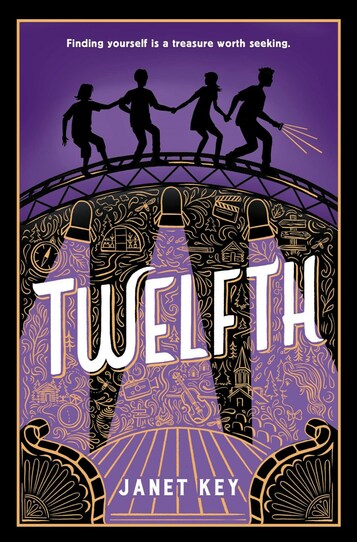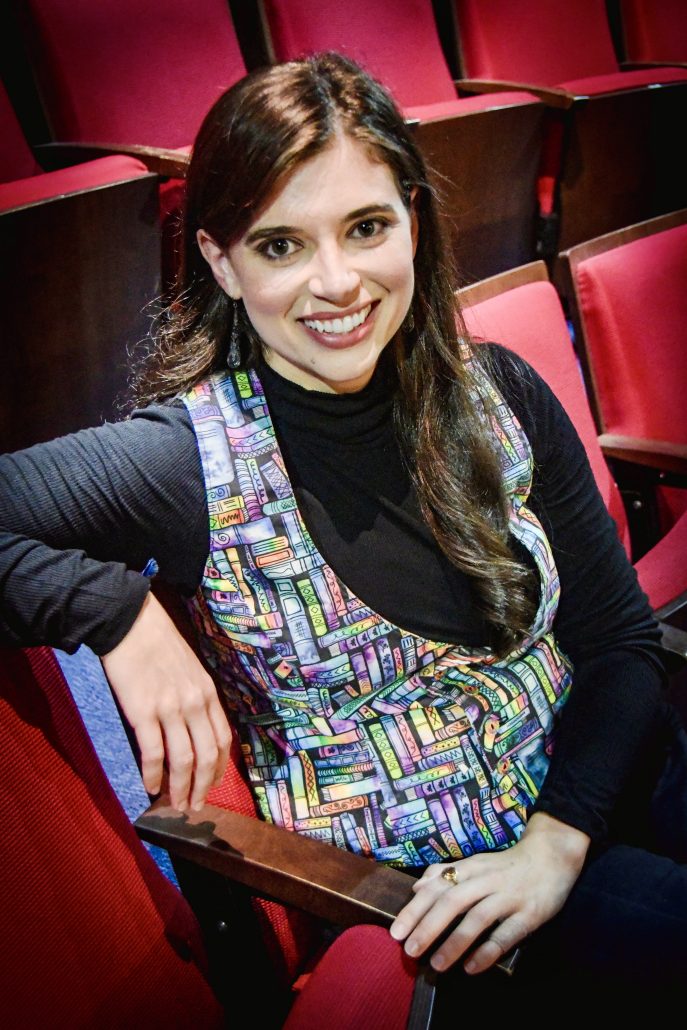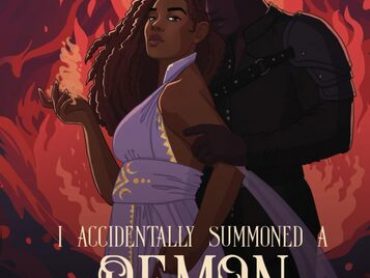Janet Key is the author of Twelfth. Twelfth follows Twelve-year-old Maren who is sure theater camp isn’t for her. The novel explores mystery, fun drama camp shenanigans. YEM was able to speak with Janet about how her real life inspired her book, her writing process, and if there will possibly be a sequel to Twelfth.
Young Entertainment Mag: When did you first know that you wanted to be a writer?
Janet Key: I don’t think I knew being a writer was a job when I was a kid, but writing stories was just something I always did, from illustrating little handmade books to forcing my plays and puppet shows on whomever happened to be on the living couch. My first-grade teacher told my parents she expected to buy book of mine one day because I was always taking “journal time” to write stories, but no news on whether she has followed through a bought a copy – please do, Mrs. Fisher!
YEM: How does it feel to have your debut novel Twelfth out?
Janet: Wonderfully surreal. I had several books rejected before TWELFTH found a home, which is a gut punch I wouldn’t wish on anyone, and then there was a few years between the book being accepted and its publication, so just knowing the book is out there, that people can read it, are reading it, have read it…it’s wonderful. And a little surreal.
YEM: Twelfth revolves around a theatre camp, do you have a special connection to theatre?
Janet: Absolutely, the book is practically a love letter to the theatre! I’ve been active in community theatre from when I was a little kid, and later went on to be a theatre major at an arts high school. I only started taking writing seriously when I took a playwriting class there. I still write scripts, but writing fiction offered more autonomy so I got pulled deeper and deeper into that world. Still, there’s nothing quite as magical to me as the hush and darkness before a play starts – there’s just something about experiencing a story live, collectively, in a community of strangers you’ll never see again, that makes the experience really special.
YEM: Did much of your real life inspire Twelfth?
Janet: The book is kind of like a scrapbook of emotional memories and intellectual obsessions collected from my life, even though the events are different. I did a report on Charlotte Cushman, the inspiration for one of the characters, for a 9th grade project; I’ve been researching Helen Gahagan Douglas, who gets a brief reference in the book, for years now to write a different project; and I’ve always loved all things Shakespeare and old Hollywood. Same thing with the theater camp – I never went to sleepaway camp, but I know the sort of rhythms and time crunches that happen when putting on a play, and I also know the sort of irresistibly fun, slightly out-of-bounds places that kids can’t resist sneaking into. Very little is directly drawn from my life, but it was certainly rich with inspiration.
YEM: What did you learn about yourself through the writing process?
Janet: I’ve always prided myself on being a very diligent writer, but I think I re-found the fun in the process of writing TWELFTH. I came to writing middle grade a little late, after writing scripts and literary fiction, and was surprised to find myself being charmed by the wild, wonderful, weird little theatre nerds populating my pages. I was also intensely aware of the things I would have loved to read about when I was a kid – something I don’t normally think about when I’m in writer-mode – and so enjoyed building a story that said the things I would have needed to hear then, too.
YEM: What did your writing process look like?
Janet: It’s a little different for each project for me – some are easier than others; some come more fully formed while others have to develop; some get written from chapter one until the end while with others I bounce through. TWELFTH was easy to work on in that I liked being in the world and hanging out with the characters, but it took a long time to develop in that I had to discover the path the mystery took. I did a lot of bouncing around while drafting this book, both in the sense of jumping between chapters and in my physical location while writing it – parts of the book were written in places as vastly varied as New York, Idaho, Texas, and Hong Kong!
YEM: What advice do you have for those who want to become writers?
Janet: I have to repeat that oft repeated advice of “read a lot, write a lot, and don’t give up,” but I’ll add that the only thing I’d change about my own writing education is to not be so precious about my work. Everything felt very important, very weighty when I was first starting to write – I wanted it to be good, I wanted to get the story right, I thought everything had to be blisteringly original and written in dazzling sharp prose. I wish I had given myself more freedom to play around on the page – because, why not? Making mistakes is part of learning, and playing around, not knowing exactly what you’re doing, is normally when you make those original, dazzling discoveries. The hope is that your worst mistakes get buried in metaphorical files on your computer, and the trust is that, after surviving so many mistakes, you know how to climb out of whatever pit you fall into on the next project.
YEM: What is a something you want your readers to takeaway from your book?
Janet: One of the main themes of the book is gender diversity, and so it’s important to me that readers leave feeling like they have a greater understanding of what that means. I also believe Shakespeare’s plays are often unfairly labeled as “too hard” and hope the book inspires a generation of readers to discover an early interest in his work. The book is also peppered with a lot of queer and/or feminist icons and moments in history that are all too often ignored or left out of popular culture, so I hope the brief glimpses of these people and moments inspire readers to seek out more information about them.
YEM: What made you want to write a book about finding your people and accepting others?
Janet: Isn’t that what we’re all looking for, all the time? And isn’t it strangely perfect how accepting others is frequently the key to finding your people and feeling accepted? I think a lot of us, for one reason or another, end up feeling like outsiders; I think one of the best things about growing up is realizing how many other people feel the same, and embracing others’ weirdness often gives us permission to embrace our own.
YEM: Do you have a line or a scene that was your favorite to write?
Janet: I’m proud of a lot of lines, but there are several plot reveals near the end that always feel very meaningful to me. I had been building toward one particular moment, when a character reintroduces themselves, from the earliest drafts of the earliest chapters, so I always feel the catharsis of accomplishment at the same time readers experience the catharsis of discovery when I read that scene. Also, there’s a play on the word “picture” that keeps another revelation hidden in plain sight, and I know I would have just loved that when I was the middle grade age.
YEM: Were any of the characters inspired by people in your life?
Janet: 99 times out of 100, my characters start as figments of pure fiction, but TWELFTH was one of the rare times I started with an overt inspiration from my real life and then the characters became fictionalized. Theo, the main character Maren’s best friend in the book, is semi-based on an unfairly confident and wonderful 12-year-old I met when I was that age as part of a theatre program. We didn’t become close friends until a few years later, but I remember being a little awed by how unapologetically herself she was. I’d also say Maren has some similarities to who I was at the time, too – a bookish introvert and dealing with some heavier issues than her peers – albeit very different circumstances. And there are a few names and dates that are in honor of some people in my past, even if the characters who wear those names are entirely made up. I recently had a friend come to visit, and even though her name didn’t appear very often, the first thing she said was, “I loved reading about so-and-so!” It’s fun little Easter egg, but honestly, characters always take on a life of their own. Even starting with real people as inspiration, these characters definitely ended up becoming entirely themselves.
YEM: Will there possibly be a sequel to Twelfth?
Janet: There’s an epilogue at the end of the book that catches up with Maren and Theo and the whole crew a year later, so I feel like you get a sense of what happens after the bulk of the story even without a separate book. I don’t have a sequel planned, and in some ways don’t feel like it’s possible given that this book follows a generations-in-the-making treasure hunt… but, hey, never say never.
YEM: Favorite quote from the series?”
Janet: I pull a lot of quotes from Shakespeare’s Twelfth Night, and I don’t dare imagine my writing is comparable to his, but one of my favorite explorations of a quote is on his line about “some are born great, some achieve greatness, and some have greatness thrust upon them.” I always hate it when I see that quote on a hoaky poster, normally with an image of an eagle or a mountain behind it, because it takes the quote out of context of the play – aka, a line written to mock a pompous character who very much so believes he deserves to have greatness thrust upon him. I let one of the teacher-characters voice my personal stance that no one should be waiting around for greatness, we should all feel empowered to define “great” however we see fit and then do our best to achieve it.





